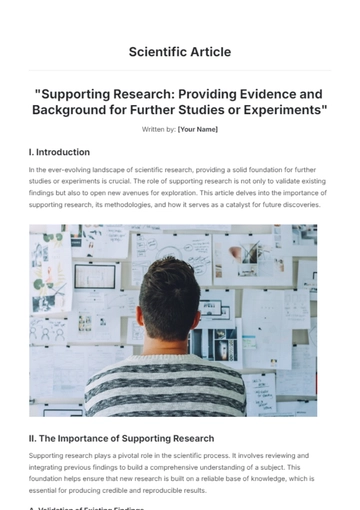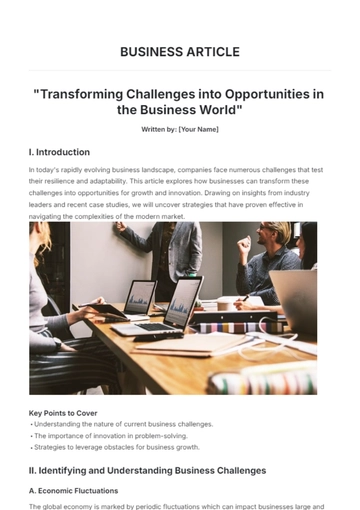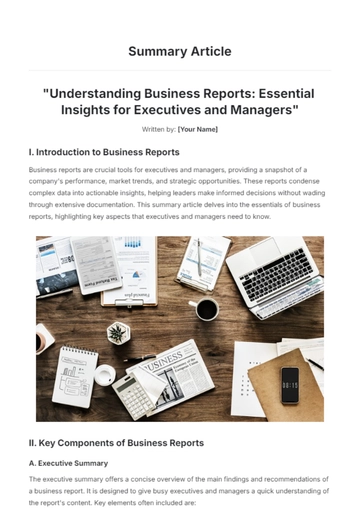Free Journal Article

Prepared By: [Your Name]
Date: [Date]
I. Introduction
Artificial Intelligence (AI) has rapidly become a transformative technology in modern business practices. From automating routine tasks to providing deep insights through data analysis, AI is reshaping the way companies operate and compete in today’s market. This article explores the various dimensions of AI's impact on business, highlighting its applications, benefits, challenges, and future potential.
II. Applications of AI in Business
AI technologies are being applied across various business functions, revolutionizing operations and creating new opportunities. Key areas include:
Customer Service
AI-powered chatbots and virtual assistants are enhancing customer service by providing quick and accurate responses to inquiries 24/7. These tools not only improve customer satisfaction but also reduce the operational costs associated with human customer service agents.
Data Analytics and Business Intelligence
Advanced AI algorithms enable businesses to analyze vast amounts of data to uncover patterns, trends, and insights. This capability allows for better decision-making and strategy formulation, making businesses more agile and competitive.
Supply Chain and Logistics
AI is optimizing supply chain management and logistics by predicting demand, identifying inefficiencies, and automating processes. This leads to reduced costs, improved delivery times, and greater overall efficiency.
III. Benefits of Implementing AI in Business
The integration of AI into business practices offers multiple advantages:
Enhanced Efficiency and Productivity
AI automates repetitive and mundane tasks, freeing up human employees to focus on more complex and creative activities. This increases overall productivity and allows businesses to achieve more with fewer resources.
Personalized Customer Experiences
By leveraging AI, companies can analyze customer data to provide personalized experiences and recommendations. This leads to higher customer satisfaction, loyalty, and ultimately increased revenue.
Cost Reduction
AI-driven automation and predictive maintenance can significantly reduce operational costs. For example, predictive analytics can forecast machinery failures, allowing for timely maintenance that prevents costly downtime.
IV. Challenges of AI Adoption in Business
Despite its numerous benefits, AI adoption is not without challenges.
Ethical and Privacy Concerns
The use of AI raises important ethical questions regarding data privacy, security, and potential biases in decision-making processes. Businesses must navigate these concerns diligently to maintain public trust and compliance with regulations.
Skills Gap
Implementing AI technologies requires a specialized skill set that is currently in short supply. Companies must invest in training and development to build a workforce capable of leveraging AI effectively.
Integration Complexities
Integrating AI systems with existing infrastructure can be complex and costly. Businesses need to ensure that their technology is compatible and that they have the necessary support systems in place.
V. Future Potential and Trends
As AI technology continues to evolve, its potential applications and benefits are expected to expand.
AI and Human Collaboration
Future AI systems will likely focus on enhancing collaboration between humans and machines, fostering a synergistic relationship where both parties can perform tasks that complement one another.
Increased AI Accessibility
The development of user-friendly AI tools will make advanced technologies accessible to smaller businesses, leveling the playing field and driving innovation across industries.
Regulatory and Ethical Frameworks
As AI becomes more prevalent, robust regulatory and ethical frameworks will be established to address concerns related to privacy, bias, and accountability, ensuring that AI is used responsibly.
VI. Conclusion
Artificial Intelligence is undeniably changing the landscape of modern business practices. By automating processes, enhancing decision-making, and creating personalized experiences, AI provides substantial benefits to businesses. However, navigating the challenges related to ethics, skills, and integration is crucial for successful adoption. As AI continues to develop, its influence on business will only grow, making it an essential component of future business strategies.
- 100% Customizable, free editor
- Access 1 Million+ Templates, photo’s & graphics
- Download or share as a template
- Click and replace photos, graphics, text, backgrounds
- Resize, crop, AI write & more
- Access advanced editor
Journal Article Template offered by Template.net. This customizable, downloadable, and printable template is designed to streamline your research and publication efforts. Easily editable in our AI Editor Tool, it allows you to tailor every detail to meet specific journal requirements. Perfect for professionals and students alike, this template ensures a polished and professional presentation every time.





























